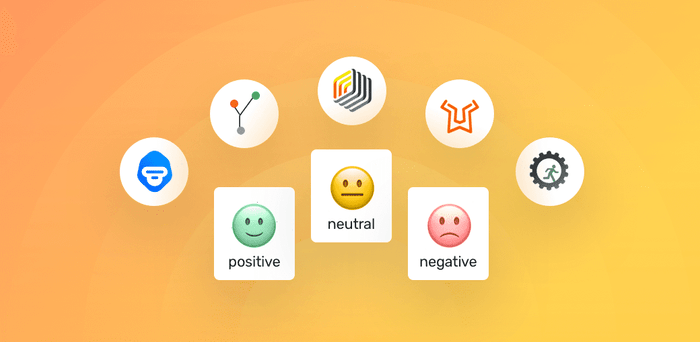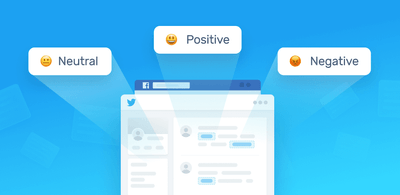Top 6 Sentiment Analysis Companies

Sentiment analysis is the automated process of recognizing positive, negative, and neutral emotions in online text data. By analyzing sentiment in social media comments, reviews, and survey responses, businesses can better understand how customers feel about their brands and products.
Try out this sentiment analyzer to get an idea of how machines analyze opinions with the help of natural language processing (NLP).
Then, check out some of the best sentiment analysis companies, offering tools and services to get started with text analysis.
Top Sentiment Analysis Companies
- MonkeyLearn | Custom models, integrations, and sentiment analysis APIs
- Repustate | Analyze sentiment in social media data
- Lexalytics | Run sentiment analysis on large datasets
- Rapidminer | Advanced tools for sentiment analysis
- Lionbridge | High-quality training data for sentiment analysis
- Sentiment Analyzer | Fast & simple tool to calculate sentiment score
MonkeyLearn
MonkeyLearn is a SaaS company that offers sentiment analysis in its suite of powerful machine learning tools. There are pre-trained models that you can put to work right away, and easily integrate with your favorite apps, like Google Sheets, Zapier, or Zendesk. You can also use APIs, which are available in all major programming languages and give you even more flexibility when connecting your tools.
If you need more accurate results from your analysis you can build a customized sentiment analysis model, and train it with your own data. This way, it can detect domain-specific vocabulary in your customer support tickets, social media data, or survey responses. The training process is fast, intuitive and, best of all, no coding or machine learning experience is needed.
Repustate
Repustate offers a sentiment analysis API that supports text in 24 languages and delivers reliable insights from social media data. Their software combines sentiment and semantic analysis to detect the emotions expressed in emojis, slang, abbreviations, and hashtags.
By creating customized sentiment analysis rules, you can adapt your model to specific industry vocabulary. Finally, you can integrate the API into your workflow through client libraries available in various programming languages.
Lexalytics
Lexalytics has been providing sentiment analysis solutions since 2003. They offer an on-premise solution (Salience) and cloud API (Semantria), which you can integrate with your workflows. You can also build fully customized models and adapt them to your business needs.
You can also create dashboards and visualizations from your data and gain deeper insights into customer emotions.
Rapidminer
Rapidminer is a data science platform that helps businesses create predictive models from data. Using Auto Model and Rapidminer Go, you can use pre-built models for sentiment analysis and customize them without code.
The platform is intuitive and well-documented. However, machine learning knowledge is highly recommended, as it will allow you to tackle more challenging tasks.
Lionbridge
Lionbridge provides sentiment annotation services for companies that want to create sentiment analysis models with machine learning. Boasting an extensive network of contributors worldwide, they are able to manually tag text in more than 30 languages.
You can customize this solution based on the scope of your project and your timeline. Then, you just have to upload your data and define the parameters for tagging your data.
Sentiment Analyzer
Sentiment Analyzer is a free tool that is super simple to use. Just copy and paste text, click ‘Analyze text’, and your results will be assigned a sentiment score.
A sentiment score of -100 indicates a very negative tone, while a score of +100 corresponds to a very positive tone.
How Businesses Use Sentiment Analysis
Sentiment analysis helps businesses understand how customers feel about their brand, giving them first-hand information to improve their products, make data-driven decisions, and deliver better customer experiences.
At the same time, sentiment analysis adds intelligence to everyday processes, enabling a more strategic approach to customers based on their emotional response.
Let’s take a look at some of the most common sentiment analysis use cases:
Social Media Monitoring
Companies are increasingly using sentiment analysis tools to monitor social media conversations, and gain real-time insight into customers’ preferences, opinions, and experiences with brands.
Sentiment analysis allows you to identify frustrated or angry customers on the fly, and respond to negative interactions right away. Being able to identify a crisis situation fast allows you to take immediate action and protect your brand’s reputation.
You might also want to track customer reactions to specific events, from a product launch to your latest marketing campaign. Using aspect-based sentiment analysis tools, you can home in on specific topics in social media conversations. This approach also allows you to Learn what customers like and dislike about your product: what do they think about your customer service? What are their favorite features?
Customer Service
Waiting too long for a response is the #1 cause of customer frustration. One of the ways businesses can improve their response times is by automating the task of tagging incoming support tickets.
Your customer service team can use sentiment analysis to tag incoming tickets based on their emotional tone, and automatically send negative tickets to the top of the queue. That way, you can be sure that the most urgent issues are being handled first.
At the same time, you can create rules to automatically route tickets. For example, you could assign tickets from angry customers to the most experienced reps on your team, to guarantee they get the best attention.
Market Research
Sentiment analysis can help businesses uncover trends and explore new market opportunities.
If you are planning to launch a new product, you might want to track sentiment relating to specific topics or words on social media. This is a great way to gain insights about what your customers need, as well as their preferences.
In a similar way, you can use sentiment analysis to analyze product reviews from your competitors and find out how customers feel towards every aspect of their business. What are they doing well? What are their weak points? Using this data can help you make strategic business decisions.
Closing
Sentiment analysis makes sense of the data you already have and reveals powerful insights that help you understand how customers feel about your brand.
With MonkeyLearn, you can use pre-trained models right away or create your own customized tool for sentiment analysis in just a few minutes.

Rachel Wolff
June 22nd, 2020






